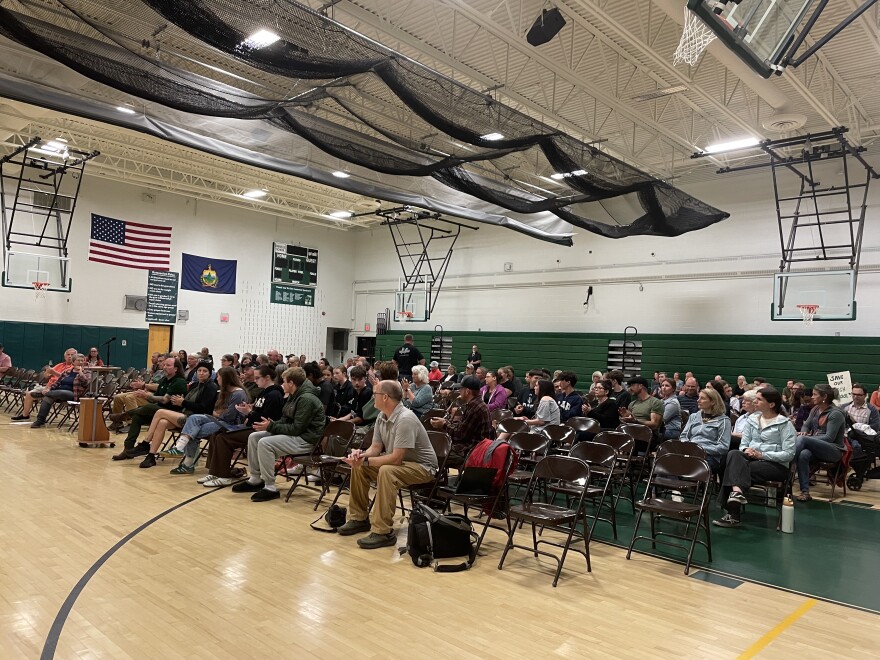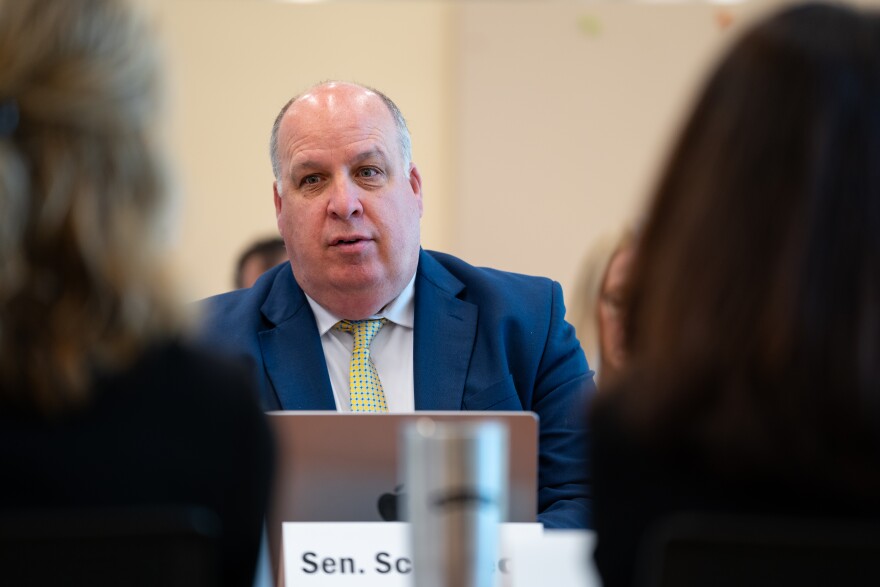A bitter debate in Danville about whether to close the town’s high school underscores the uncertainty many Vermont schools face as the state prepares to overhaul its education system.
The Danville school board reluctantly announced this week that they would hold a special town-wide referendum on Dec. 6 on whether to close the school and instead offer families vouchers to the school of their choice. It comes after a local parent submitted a petition requesting the vote.
But within days after that petition was submitted, the town clerk reported that more than a dozen people asked for their signatures to be withdrawn. Michelle Leclerc, the Danville treasurer, told Vermont Public on Thursday that people had written to her office saying they had been “misinformed” and given “false information.”
For now, the petition still has enough signatures to require the vote. But more still could ask to remove their names before Nov. 4, she said, when the school board is scheduled to sign a warrant for the referendum.
The contention in Danville has been prompted by a sweeping education reform effort Gov. Phil Scott signed into law this July that could usher in widespread consolidation. A special task force is now at work on proposals for new school district maps, which lawmakers will consider when they return to the Statehouse this winter.
What’s afoot in Montpelier has left local school officials bracing for impact, but also unsure of what reform could mean for them. And Danville, which operates one of the last remaining public high schools in the Northeast Kingdom, also faces a unique set of circumstances.
The closest alternative, St. Johnsbury Academy, is private, and the role that one of its teachers — Vermont Senate Minority Leader Scott Beck — has had in encouraging the vote to close has prompted outcry among the Danville School’s supporters.
“It's reprehensible, and I think the voters are going to see that right away,” one resident, Eric Hutchins, told the school board during a raucous meeting Tuesday evening.

Small schools like Danville, where the high school enrollment hovers around 80 pupils, are deeply fearful the law, known as Act 73 could force them to close. And in recent weeks, Beck has warned school officials in Danville, as well as nearby Cabot — whose high school is even smaller — that it may be now or never if they want to decide their own fate.
Beck, a Caledonia County Republican, has told local school board members that it’s likely lawmakers will pass a measure in the upcoming legislative session that could remove a district’s ability to turn to school choice in the event that it closes a school. Instead, he’s said, a community might be required to select three public schools to send their children. For Danville, where the nearest large high schools are all private, that could be a problem.
But other lawmakers have pushed back, saying it would be unwise for communities to act in haste based on conjecture.
“Trying to predict the future of Act 73 is a fool’s errand,” Peter Conlon, the chair of the House Education Committee, told Seven Days.
In Cabot, school officials have since decided to take a wait-and-see approach. The board shelved a survey last week it had planned to send to residents, which included Beck’s warning that school choice could go away for good unless communities make the switch now. But in Danville, the petition — which was organized by a local parent who also happens to be a St. Johnsbury Academy teacher — has tied the board’s hands.
On Tuesday evening, Danville school board members told a crowded gymnasium of residents they had no desire to close the high school.
Clayton Cargill, the school board chair, nodded in agreement as residents filed up to the microphone to accuse Beck of fearmongering in an attempt to funnel more students to St. Johnsbury Academy, his employer.
“I feel lied to,” Cargill said at one point.

Beck, in an interview after the meeting, said that he had offered the advice in good faith. He noted that a measure that would have disallowed districts from turning to choice was included in earlier drafts of Act 73, and only removed during end-stage negotiations.
Besides, he said, the school he teaches at has more than 900 pupils, so it doesn’t need Danville’s students to stay afloat.
“They're not critical to St. Johnsbury Academy. I mean, if they wanted to come, we’d certainly welcome them, but the school has been around for a long time,” he said.
Peter Mantius, the Danville parent who organized the petition, also works as a teacher at St. Johnsbury Academy. And while he said he didn’t ask for the vote to benefit his employer, he said his experience there had allowed him to see first-hand what the school offers.
“This is something that I think I have a front row seat to, and I sometimes wish that the friends and community that my children are with had the same opportunities,” he said.
Overwhelmingly, speakers at Tuesday’s board meeting were there to argue for Danville high school’s continued existence.
David Warren, a veteran teacher at Danville, said it should be noted that nearby Lyndon Institute and St. Johnsbury Academy are both private.
“They don’t have to take your kids,” he said. “And how do I know that? Because we've been giving kids from those two schools here at Danville a second chance — a first chance — because they couldn't make it at a bigger school for the 27 years I've been here.”
Several students said they liked Danville’s small size.
“I am not a student who struggles academically, but the thought of a newer and bigger classroom setting makes me question my academic future,” Jordan Sullivan-Stevens, an eighth grader, told the board.

But there were dissenters. Sophomores Bella Stebbins and Ash Bedard filed up to the microphone together. Stebbins complained about behavioral problems at Danville, and Bedard followed after to say the school was limited in what it could provide.
Bedard said she knew they were both “disagreeing with everybody here.” But “other schools have more to offer in educational and extracurricular activities,” she said.
Most people left the Danville gymnasium Tuesday evening after they had said their piece. But Danville’s school board members remained, workshopping a letter to the state’s redistricting task force.
“We are at risk of making a very reactionary decision that will change this town considerably in unforeseen ways,” they wrote in their letter.
“Beholden to the whims of your Task Force, and more broadly, the State Legislature,” the letter continued, “...we are forced to assume and plan for the worst case scenario, and do everything in our power to prevent it.”
“And so our ask to you,” they added, “is to give us clarity.”





